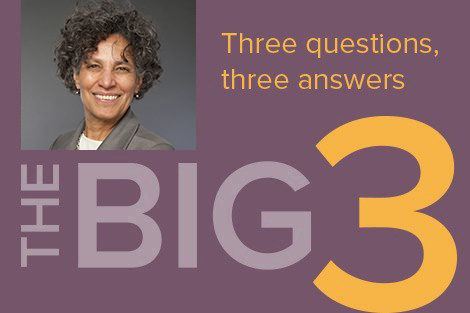June 18, 2020 – Mary Bassett, director of the François-Xavier Bagnoud (FXB) Center for Health and Human Rights at Harvard University at Harvard T.H. Chan School of Public Health, discusses Boston Mayor Marty Walsh’s June 12 declaration that racism is a public health crisis in Boston—and what steps should come next to make good on those words.
You were quoted in the Boston Globe as saying that Mayor Walsh’s plan to reroute $12 million in police overtime spending to programs aimed at combating systemic racism and economic and racial inequities is “not enough to tackle the issues that [Walsh] appropriately mentioned in the announcement.” Can you discuss what more should be done?
The declaration is one of the best written ones that I’ve seen. These sorts of declarations have been issued by a couple of dozen jurisdictions, and there are even a couple of states that are close to issuing proclamations of racism as a public health crisis. The Boston declaration talks about the impact of racism and the importance of access to high quality education, access to housing, access to the labor market. All of these have a bearing on health, as the declaration outlines.
But improving the educational infrastructure, closing educational attainment gaps, and addressing the challenges of adequate housing are all big-ticket items. The proclamation notes that these are needed to improve health, but $12 million would be in no way adequate to accomplish this. These sorts of changes will take a large societal investment. The actions that will be needed to address centuries worth of deprivation will require a substantial realignment of how we set our budgets. We need to see our budgets as moral documents.
The declaration did include an emphasis on data, which I think is an important part of what we need, and which will require an investment in the public health infrastructure. Without racial and ethnic data that allow us to track health inequalities, we can’t assess where we are, or how well we’re doing towards ameliorating those outcomes. The fact is, when we no longer see a gap in life expectancy by race and ethnicity in this city, in this state, in the nation, we’ll know that we’ve finally overcome racism.
What would be your top priorities for Boston in terms of where rerouted funds should go?
When I joined the New York City government as health commissioner in 2014 after the election of Mayor Bill de Blasio—who was elected on a ticket promoting the idea that we should end “a tale of two cities” in New York, and it should be one city that serve all who live there—people asked, “What are your priorities? Health? Education? Jobs? Housing?” And I was thinking, “These are all really important.” But I would probably put housing and jobs first, because when people can have a decent life, they have better health.
Federal, state, and local governments have really walked away from public investment in housing on a large scale. And that has to change. Ensuring that the market allows everyone to have access to affordable housing will require government investment.
Boston has some stunning wealth inequalities. Nationally, it’s often said that African Americans have one-tenth the wealth of whites. In Boston, the Federal Reserve Bank—hardly a radical outfit—did a study showing that the average net worth of a black Bostonian family was $8. The headline in the Boston Globe read “That was no typo.” The average net worth of a white family, on the other hand, was close to $250,000. The difference basically reflects home ownership, and the long shadow cast by the practice of redlining, which deprived black families access to the mortgage market and thereby one of the most important assets that families ever acquire.
Are you hopeful that real change can happen towards dealing with structural racism and its devastating outcomes?
I’m more hopeful than I’ve been in a long time. I’ve never seen such a broad conversation about racism. I think it’s fair to say that people remain uncomfortable about using the world racism, including within higher education. But the fact that the word is being uttered by politicians at all levels of government—that in itself is substantial.
Of course, what’s most important is that the conversation opens the door to action, and that’s what we should all be held accountable for—action.
